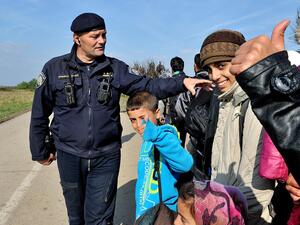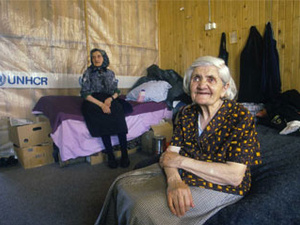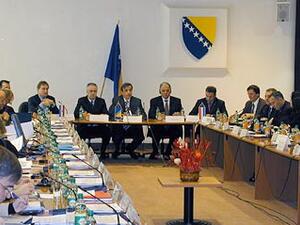UNHCR, Stability Pact chief urge support for the Balkans
UNHCR, Stability Pact chief urge support for the Balkans
GENEVA - U.N. High Commissioner for Refugees Ruud Lubbers and the newly appointed head of the Balkan "Stability Pact," Erhard Busek, said today that long-term Balkan stability was linked to the fate of an estimated 1 million people who remain uprooted as a result of the region's wars.
"Prospects for lasting peace and stability throughout the Balkans largely depend on whether we can offer a meaningful future to those displaced by war," said Busek - a former Austrian vice-chancellor and Balkan expert who took over the Stability Pact for South Eastern Europe earlier this year.
The situation in the Balkans and the people uprooted by the wars of the 1990s were the focus of the meeting between Busek and Lubbers, held at UNHCR's Geneva headquarters. Busek said he picked the UN refugee agency's Geneva office as one of his first foreign destinations to stress the importance of refugee returns for overall Balkan stability.
In a joint statement, the two officials said a lot had been achieved since the guns fell silent in Bosnia more than six years ago. They noted that an estimated 2 million people have since gone back to their countries and their homes. During 2001 alone, more refugees and internally displaced persons were able to go home to areas controlled by opposing ethnic factions in Bosnia and Herzegovina and Croatia than at any other time since the Dayton peace agreement was signed in 1995.
Members of minority communities have been returning to extremely difficult areas, such as Srebrenica and Foca. This is seen as an indication that many of the legal, administrative and security obstacles have disappeared. But the two officials said continued financial and political support was essential to help some 1 million people still uprooted by the series of conflicts which left parts of former Yugoslavia in ruins.
"Humanitarian and development funds for this region are in increasingly short supply, just at the time when they are most needed," said High Commissioner Lubbers. "Young people will not return to areas where there are no houses, no employment and no opportunity to raise families," he added.
Busek and Lubbers commended the nations of former Yugoslavia on their efforts to make refugee returns happen. They cited a number of improvements, including new legislation which makes returns easier. But they also acknowledged that some will not return to their places of pre-war residence and that they need financial help to make new homes where they are.
Stability Pact Special Co-ordinator Busek said Bosnia, Croatia and Yugoslavia should be granted access to international lending and credit facilities. He also encouraged the development of private investment, especially to build new housing.
The two senior officials called on the international community to make good on the financial commitments they had made to the region. They noted that the heavy international investment in ending the wars in Bosnia and Herzegovina and Croatia, and more recently in Kosovo and the former Yugoslav Republic of Macedonia, should now be followed by generous investment in peace.








